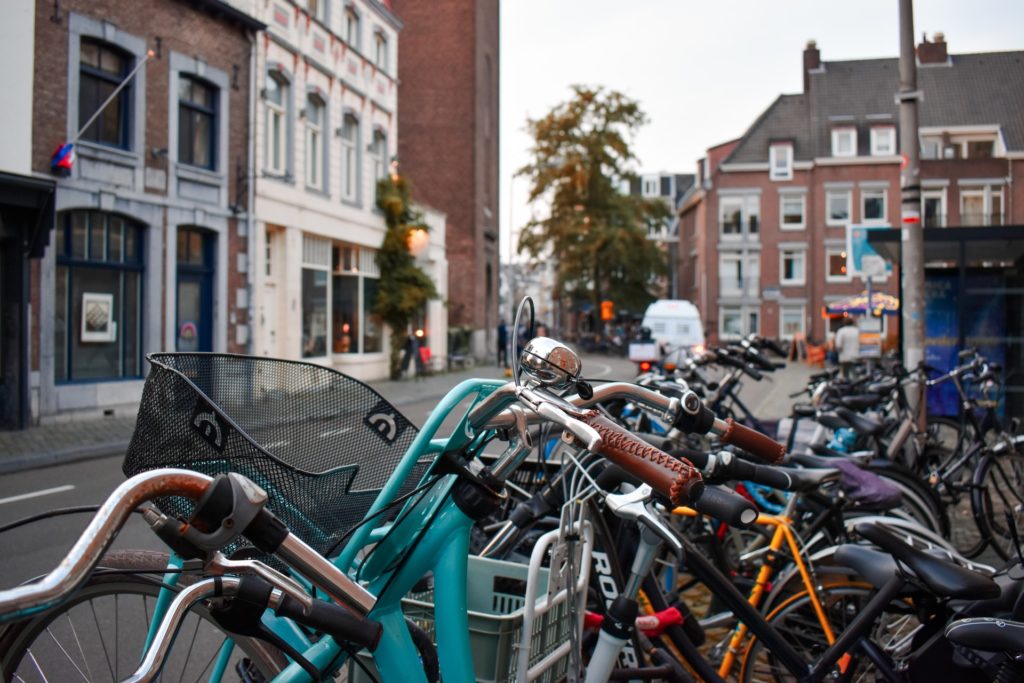How The Dutch Reach Became an Official Recommendation in the UK Posted by Sten on Jan 31, 2022 in Culture
Since last Saturday, the UK Highway Code explicitly includes a recommendation for the Hollandse Greep (Dutch reach). And this can be a live-saving move – if you open your door and hit somebody, you can be fined a £1,000! So what is this Dutch reach, why did it become a recommendation now, and – the usual question in this series on “Dutch”-terms – what makes the Dutch reach Dutch?
For other terms in this series of “Dutch” words, check this link.
More safety for pedestrians and cyclists
The newly introduced rule is mostly there to protect pedestrians and cyclists. When you park your car and want to open the door, you might be opening onto a walkway or cycling path. If you didn’t check for incoming traffic, opening that door could lead to het ongeluk (accident), with potentially fatal consequences.
One father who spearheaded the recommendation of the Dutch reach in the UK is Jeff Boulton, whose son Sam died after a sudden opening door knocked him into the path of traffic in 2016.
So how can the Dutch reach achieve more safety?
Dutch Reaching around
The point of the Dutch reach is that when you open the door, you use the opposite hand (farthest from the door handle) to open the door. This way, your body naturally moves around, and your head turns in the direction of oncoming traffic. This encourages you to see cyclists and pedestrians coming that you might otherwise hit when opening the door. It’s a simple nudge to make our behavior in traffic safer!
Uber made an instructional video on the Dutch reach and even sees potential for a new danspasje (dance move). See that above.
What’s Dutch about the Dutch reach?
So why is this reach called the Hollandse greep (Dutch reach)?
Probably because the Dutch have had this issue for a while. The Netherlands is famous for its fietscultuur (bike culture). So we always had a lot of bikes in traffic that needed to be heeded.
But that doesn’t mean that fietsers (cyclists) were always given that much attention. In 1961, the newspaper De Telegraaf published a weekly rubriek (column) named “Wegwijzer naar een veilig land om in te wonen” (guide to a safe country to live in). On August 19, 1961, it was titled “Hoe stapt u uit een auto?” (How do you get out of a car?). It started like this:
U zult vreemd opkijken als men u vraagt: “Hoe stapt u uit een auto?” Waarschijnlijk zult u antwoorden: “Nou, gewoon.” En toch worden per jaar velen letterlijk het ziekenhuis ingeslagen doordat iemand uit een auto stapt. Eenvoudigweg door het onbedachtzaam openen van de portieren.
(You may find yourself confused if one asks you: “How do you get out of a car?” Probably, you’d answer: “Well, just like that.” And yet, many are literally beaten into the hospital every year because somebody gets out of a car. Simply due to thoughtless opening of the doors.)
After giving an example of a situation where a “normal” way of opening the door can lead to a fatal accident, the rubriek continues as follows:
Zullen we afspreken, dat wij, automobilisten, allemaal vóór het openen van de portieren eerst goed achterom kijken of zich verkeer naast of dicht achter de auto bevindt?
(Shall we agree that we, car drivers, all look back properly before opening the doors to see if there is traffic next to or close behind the car?)
And here comes the tip for the Hollandse greep:
Een goede tip: Open het LINKERportier steeds met uw RECHTERhand en het RECHTERportier met uw LINKERhand. Dan moet u zich wel omdraaien. Zullen wij ons dat aanwennen? Een kleine moeite, en u zult zien dat het aantal ongevallen door plotseling opengeworpen portieren snel afneemt.
(A good tip: Always open the LEFT door with your RIGHT hand and the RIGHT door with your LEFT hand. Then you will have to turn around. Shall we get used to that? It’s little trouble, and you will see that the number of accidents due to suddenly opened doors will quickly decline.)
Like in 1961, this is all just an advies (advice) and aanbeveling (recommendation). Making it mandatory could be counterproductive: According to the Dutch government, some doors are difficult to open with the opposite hand. Because opening that door could lead you to focus more on the opening itself, it might be less safe than simply getting used to paying attention before opening a door.
Nevertheless, the Hollandse greep is taught in Dutch driving schools. It isn’t known by that name in the Netherlands, though!
Opposite terms?
Many “Dutch”-terms, like Dutch courage, Dutch uncle or Dutch bargain, are words that basically take on a negative or opposite meaning when the word “Dutch” is attached to it. Since with the Dutch reach, we use the opposite hand, it might even be that the name found its origin here.
Do you use the Hollandse greep? Let me know in the comments below!

Build vocabulary, practice pronunciation, and more with Transparent Language Online. Available anytime, anywhere, on any device.






Comments:
Ali:
It is not ‘mandatory’, it is recommended.
Sten:
@Ali You are absolutely correct, I should have checked the Highway Code myself from the start. I’ve updated it in the post.
The reporting on this is awful. The Evening Standard reports that you can get fined a 1000 pounds if you don’t open the door with the right hand – but that’s if you injure somebody when opening the door. Those two are not the same thing.
The BBC article isn’t great either, it’s cloudy at best. And the Dutch Telegraaf doubles down on the BBC reporting and says it is mandatory, and if one doesn’t use the Dutch reach they are liable to be fined. A lesson on what news outlets to avoid, thank you!